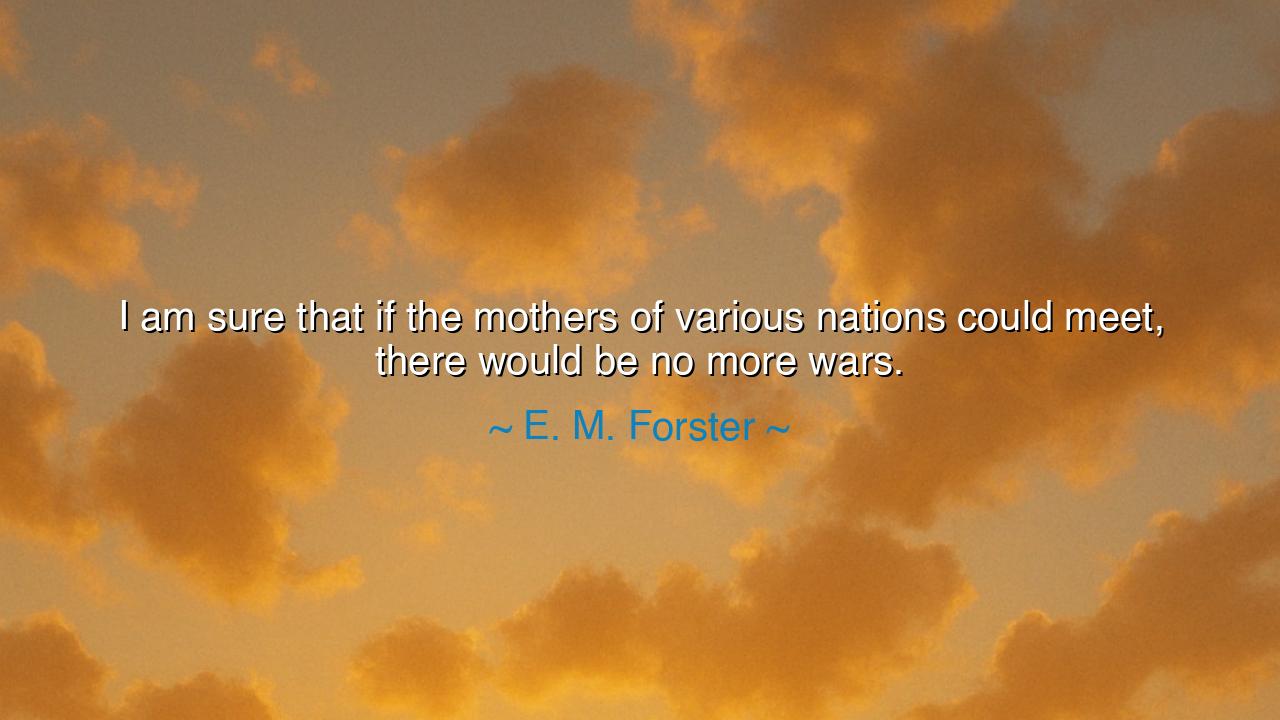
I am sure that if the mothers of various nations could meet
I am sure that if the mothers of various nations could meet, there would be no more wars.






In the profound and compassionate words of E. M. Forster, “I am sure that if the mothers of various nations could meet, there would be no more wars,” we hear the cry of a heart that has seen the madness of conflict and still dares to hope in the tenderness of the human spirit. These words are not mere sentiment—they are a vision of peace rooted in the oldest truth of humanity: that a mother’s love recognizes no borders, no flags, no enmities. Forster, a man of letters and conscience, understood that while men often build nations through ambition and pride, it is the mother who sustains them through compassion and care. He believed that if the hands that rock the cradle were given the power to guide the world, those hands would not raise swords, but would reach out to heal.
The origin of this quote rests in the shadow of the early 20th century—a time when Europe, Forster’s own home, was torn apart by the Great War and later stood on the brink of another. As an English novelist and moral thinker, Forster witnessed the futility of nationalism and the deep wounds inflicted by hatred. His words reflect not only his pacifism but his faith in the universal bond of motherhood—that sacred instinct which values life above ideology, and tenderness above triumph. To Forster, mothers were not merely women bound to their own families, but the keepers of the world’s conscience. He saw in them the potential for a peace that no government or army could forge, because their love speaks the oldest and most sacred language—the language of life itself.
The ancients too would have understood this wisdom. In Greece, the goddess Demeter was revered as the protector of both fertility and peace, for she wept for her daughter, Persephone, when she was taken to the underworld. Her tears brought winter upon the earth—a reminder that the sorrow of a mother touches all creation. In India, the ideal of “Vasudhaiva Kutumbakam”—the world as one family—finds its truest form in motherhood, for a mother’s love does not discriminate between her own child and another’s. And even in the scriptures of many faiths, the heart of the divine is described as maternal—ever forgiving, ever nurturing, ever merciful. The wisdom of the ancients and the insight of Forster are one and the same: that the path to peace lies not in power, but in empathy, and that no one knows empathy better than the mother.
Consider the story of Julia Ward Howe, the American abolitionist and poet who, after witnessing the devastation of the Civil War, called upon women around the world to unite in peace. In 1870, she wrote the “Mother’s Day Proclamation,” urging mothers to stand against war and teach their sons the sanctity of life. She declared, “Our sons shall not be taken from us to unlearn all that we have been able to teach them of charity, mercy, and patience.” Her dream was that mothers, joined in understanding and sorrow, would form a council of peace powerful enough to still the drums of war. Though her vision was never fully realized, her words echo Forster’s conviction—that if the mothers of nations could meet, their shared grief and love would end all wars before they began.
Forster’s quote carries not only hope but also lament, for he knew that the world rarely listens to the voices of the gentle. The leaders of nations often speak in the language of conquest and pride, but the mother’s heart speaks in the language of tears and nurture. When men see an enemy, a mother sees a child—someone’s son or daughter, loved by another as fiercely as she loves her own. It is this shared humanity, hidden beneath the divisions of race and nation, that Forster believed could dissolve the hatred that fuels conflict. If mothers could look into one another’s eyes—not as foreigners, but as fellow keepers of life—the illusion of difference would crumble, and compassion would triumph over fear.
This truth is not abstract; it is written in the quiet acts of love that defy violence every day. During the Bosnian War, when Sarajevo was under siege, women from opposing sides secretly gathered to share food, prayers, and the names of missing children. In those meetings, there was no talk of politics—only grief, only love. They mourned together as mothers, and in their shared sorrow, the divisions of religion and ethnicity dissolved. Their example is a living echo of Forster’s vision: that motherhood, in its purest form, unites rather than divides.
Let this truth be handed down as a lesson to future generations: when hatred rises, remember the heart of the mother. Let nations honor compassion as much as strength; let leaders listen to those whose hands have cradled life, not destroyed it. Seek to understand others as deeply as a mother understands her child, and peace will no longer be a dream but a duty. Forster’s words call not only to mothers, but to all humankind—to awaken the maternal spirit within us, the part of the soul that protects, forgives, and cherishes life above all else.
Thus, in the luminous wisdom of E. M. Forster, we are reminded that the power to end war does not lie in treaties or armies, but in hearts that can still love across boundaries. The mother’s heart—universal, enduring, unyielding—is the true architect of peace. If the world could learn to see with her eyes and to feel with her compassion, then indeed, there would be no more wars—only the quiet, enduring labor of love that keeps the world alive.






AAdministratorAdministrator
Welcome, honored guests. Please leave a comment, we will respond soon